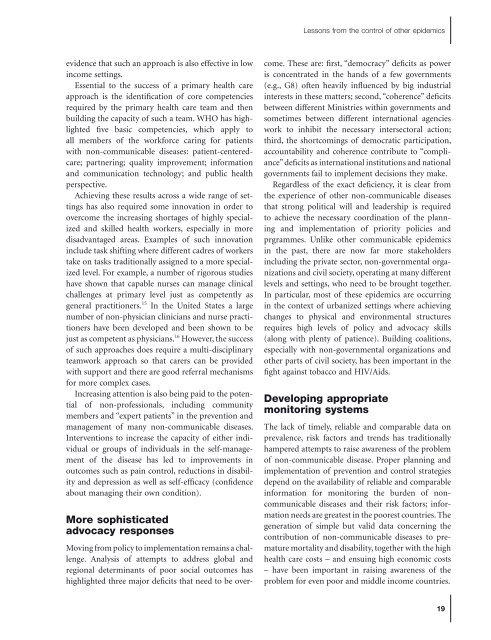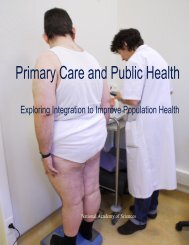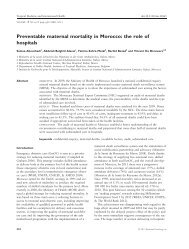Preventing Childhood Obesity - Evidence Policy and Practice.pdf
Preventing Childhood Obesity - Evidence Policy and Practice.pdf
Preventing Childhood Obesity - Evidence Policy and Practice.pdf
You also want an ePaper? Increase the reach of your titles
YUMPU automatically turns print PDFs into web optimized ePapers that Google loves.
Lessons from the control of other epidemics<br />
evidence that such an approach is also effective in low<br />
income settings.<br />
Essential to the success of a primary health care<br />
approach is the identification of core competencies<br />
required by the primary health care team <strong>and</strong> then<br />
building the capacity of such a team. WHO has highlighted<br />
five basic competencies, which apply to<br />
all members of the workforce caring for patients<br />
with non-communicable diseases: patient-centeredcare;<br />
partnering; quality improvement; information<br />
<strong>and</strong> communication technology; <strong>and</strong> public health<br />
perspective.<br />
Achieving these results across a wide range of settings<br />
has also required some innovation in order to<br />
overcome the increasing shortages of highly specialized<br />
<strong>and</strong> skilled health workers, especially in more<br />
disadvantaged areas. Examples of such innovation<br />
include task shifting where different cadres of workers<br />
take on tasks traditionally assigned to a more specialized<br />
level. For example, a number of rigorous studies<br />
have shown that capable nurses can manage clinical<br />
challenges at primary level just as competently as<br />
general practitioners. 15 In the United States a large<br />
number of non - physician clinicians <strong>and</strong> nurse practitioners<br />
have been developed <strong>and</strong> been shown to be<br />
just as competent as physicians. 16 However, the success<br />
of such approaches does require a multi - disciplinary<br />
teamwork approach so that carers can be provided<br />
with support <strong>and</strong> there are good referral mechanisms<br />
for more complex cases.<br />
Increasing attention is also being paid to the potential<br />
of non - professionals, including community<br />
members <strong>and</strong> “ expert patients ” in the prevention <strong>and</strong><br />
management of many non - communicable diseases.<br />
Interventions to increase the capacity of either individual<br />
or groups of individuals in the self - management<br />
of the disease has led to improvements in<br />
outcomes such as pain control, reductions in disability<br />
<strong>and</strong> depression as well as self - efficacy (confidence<br />
about managing their own condition).<br />
More s ophisticated<br />
a dvocacy r esponses<br />
Moving from policy to implementation remains a challenge.<br />
Analysis of attempts to address global <strong>and</strong><br />
regional determinants of poor social outcomes has<br />
highlighted three major deficits that need to be overcome.<br />
These are: first, “democracy ” deficits as power<br />
is concentrated in the h<strong>and</strong>s of a few governments<br />
(e.g., G8) often heavily influenced by big industrial<br />
interests in these matters; second, “ coherence ” deficits<br />
between different Ministries within governments <strong>and</strong><br />
sometimes between different international agencies<br />
work to inhibit the necessary intersectoral action;<br />
third, the shortcomings of democratic participa tion,<br />
accountability <strong>and</strong> coherence contribute to “ compliance<br />
” deficits as international institutions <strong>and</strong> national<br />
governments fail to implement decisions they make.<br />
Regardless of the exact deficiency, it is clear from<br />
the experience of other non - communicable diseases<br />
that strong political will <strong>and</strong> leadership is required<br />
to achieve the necessary coordination of the planning<br />
<strong>and</strong> implementation of priority policies <strong>and</strong><br />
prgrammes. Unlike other communicable epidemics<br />
in the past, there are now far more stakeholders<br />
including the private sector, non - governmental organizations<br />
<strong>and</strong> civil society, operating at many different<br />
levels <strong>and</strong> settings, who need to be brought together.<br />
In particular, most of these epidemics are occurring<br />
in the context of urbanized settings where achieving<br />
changes to physical <strong>and</strong> environ mental structures<br />
requires high levels of policy <strong>and</strong> advocacy skills<br />
(along with plenty of patience). Building coalitions,<br />
especially with non-governmental organizations <strong>and</strong><br />
other parts of civil society, has been important in the<br />
fight against tobacco <strong>and</strong> HIV/Aids.<br />
Developing a ppropriate<br />
m onitoring s ystems<br />
The lack of timely, reliable <strong>and</strong> comparable data on<br />
prevalence, risk factors <strong>and</strong> trends has traditionally<br />
hampered attempts to raise awareness of the problem<br />
of non - communicable disease. Proper planning <strong>and</strong><br />
implementation of prevention <strong>and</strong> control strategies<br />
depend on the availability of reliable <strong>and</strong> comparable<br />
information for monitoring the burden of non -<br />
communicable diseases <strong>and</strong> their risk factors; information<br />
needs are greatest in the poorest countries. The<br />
generation of simple but valid data concerning the<br />
contribution of non - communicable diseases to premature<br />
mortality <strong>and</strong> disability, together with the high<br />
health care costs – <strong>and</strong> ensuing high economic costs<br />
– have been important in raising awareness of the<br />
problem for even poor <strong>and</strong> middle income countries.<br />
19

















